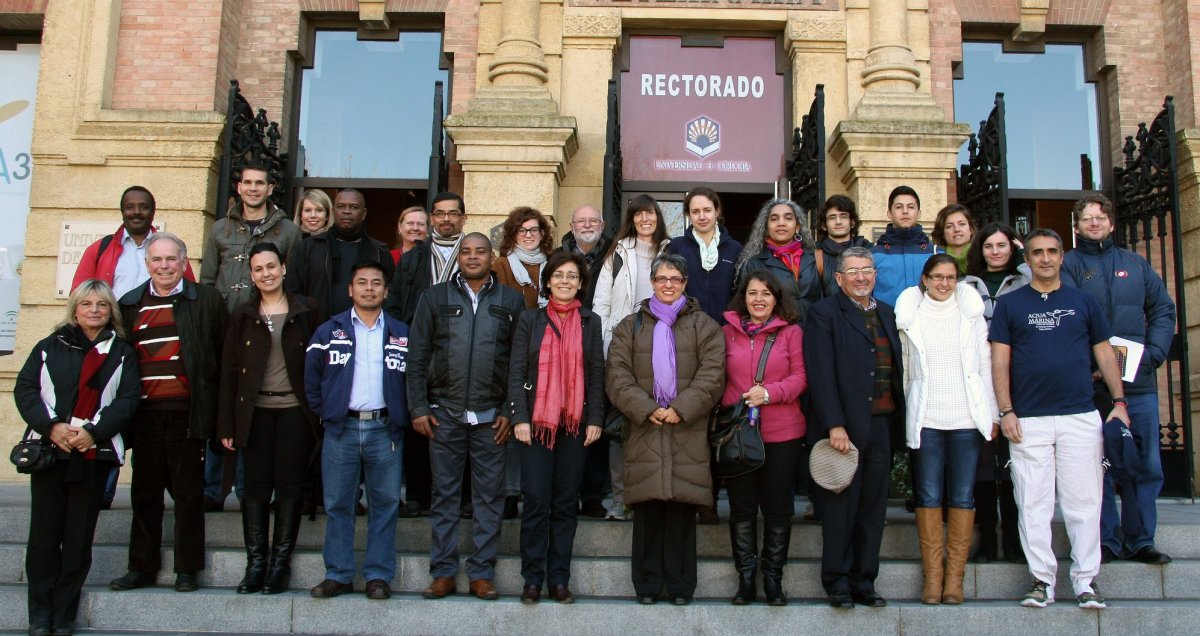Between 12 and 20 February the annual coordination meeting of the project COMET-LA (Community-based Management of Environmental Challenges in Latin America) has taken place. COMET-LA has the ultimate objective to create a 'learning arena' for integrating local and scientific knowledge in the management and sustainable governance of different social-ecological systems (SES), with special emphasis on those based on community management natural resources.
La reunión se inició en la Universidad de Córdoba, analizando los avances realizados en la caracterización de sistemas socio-ecológicos usando metodologías participativas y adaptadas a las realidades locales y consensuando los enfoques metodológicos a utilizar en el segundo año. En este segundo año se realizará un análisis estructural de prospectiva para identificar las variables clave que pueden influenciar la evolución de los SES.
Con el objetivo de contribuir a esta arena de aprendizaje, además de las reuniones metodológicas se han realizado diferentes visitas de terreno para conocer iniciativas de manejo sostenible de recursos naturales en Europa. Así, el día 15 se visitaron las instalaciones de la planta de energía temosolar La Africana en Posadas (Córdoba) y de la Agroenergética de Baena dónde se usan los residuos de biomasa producidos por el olivar para producir electricidad.
Entre los días 16 y 20, Sagremarisco, el socio portugués de COMET-LA organizó una visita de campo a los sistemas socio-ecológicos marinos de los Parques Naturales de la Ría Formosa y Cabo San Vicente que ha permitido contrastar las similitudes y las diferencias entre los SES de ambos continentes. Se han analizado las problemáticas existentes en ellos y se ha interaccionado con actores locales.
COMET-LA analiza los sistemas socioecológicos de tres casos de estudio: la gestión forestal y el uso del suelo por la comunidad chinanteca de Santiago Comaltepec, en México; el manejo de la biodiversidad y los recursos hídricos por parte de los Consejos Comunitarios de las Comunidades Negras de Bajo Calima y Alto y Medio Dagua, en Colombia; y la gestión costera y marina del entorno del estuario argentino de Bahía Blanca.
El consorcio de COMET-LA está formado por once entidades científicas y locales de Europa y Latinoamérica: la Universidad de Córdoba, la Universidad Nacional Autónoma de México (UNAM) y la Asociación Civil de Estudios Rurales y Asesoría Campesina, en México; la Pontificia Universidad Javeriana y los Consejos Comunitarios de las Comunidades Negras de la Cuenca Baja del Río Calima y el Alto y Medio Dagua, en Colombia; el Instituto Argentino de Oceanografía (IADO-CONICET), y la Fundación Aquamarina en Argentina; el Instituto Noruego de Luftforskning; The James Hutton Institute, del Reino Unido; la empresa portuguesa Sagremarisco y el Comité Español de la UICN (Unión Internacional para la Conservación de la Naturaleza).

The winners will be proclaimed in July, during COMET-LA´s team visit to Latin America
Under the slogan: "How do you imagine the future of your community?" Primary and secondary schools in the communities where COMET-LA works have launched their imagination and embodied in a drawing of how they imagine their community within a few years. More than 700 young people from Santiago Comaltepec, in Mexico, the communities of La Delfina and Zaragoza, in Colombia, and the estuary of Bahia Blanca in Argentina, participate in this call. The winners will be selected in July during COMET-LA´s research visit to each of the three countries.
Given its involvement in the subject, the project COMETLA participates today on the World´s Day of Biodiversity, which this year has the theme "Water and Biodiversity", remembering that biodiversity and water resources are essential to ensure important aspects of human development such as food security, CO2 uptake, and production of medicinal plants.
Pepa Ambrosio, researcher of COMET-LA from the University of Córdoba team, was speaker on the Summer School “ Adaptation Governance: Spatial, Temporal, and Cultural Constraints and Opportunities” organised by Central European University and co-organised byVrije Universiteit Amsterdam, Alpen-Adria-Universität Klagenfurt.
Maria del Mar Delgado, COMET-LA coordinator, and Tania de la Fuente, project partner coordinator on behalf of CeUICN, attended the meeting organized by the European Commission that took place in Brussels on 10th and 11th June: "Fostering innovative dialogue between researchers and stakeholders to meet future challenges: Land, Soil, Desertification, Urban and Community-Based Environmental Management".
The ![]() X Biodiversity Forum of the Spanish Committee of IUCN, “Designing sustainable models of governance and natural resource management in order to face environmental challenges” will be performed in the framework of the project "COMET-LA" (COmmunity-based Management of EnvironmenTal challenges in Latin America).
X Biodiversity Forum of the Spanish Committee of IUCN, “Designing sustainable models of governance and natural resource management in order to face environmental challenges” will be performed in the framework of the project "COMET-LA" (COmmunity-based Management of EnvironmenTal challenges in Latin America).
The Spanish Committee of IUCN, through collaboration with the Centre for Mediterranean Cooperation (IUCN Med) offers a workshop on "applications of categories and criteria of the IUCN Red List."
The meeting focused on community management initiatives as a tool to mitigate the effects of climate change and to involve the population in adaptation strategies.
Community management of natural resources and the challenges that climate change means for it have been the main focus of the X Biodiversity Forum of the Spanish Committee of IUCN: "Designing sustainable governance and management models for the sustainable management of natural resources to face environmental challenges "held at the University of Cordoba (UCO) on the 24th and 25th of September.
On Friday September 27 the Researchers’ Night was held in Córdoba, an initiative within the PEOPLE Programme (7th Framework Programme of the European Union). The aim of the Researchers' Night was to approach people to science issues. This initiative takes place simultaneously in over 200 European cities since 2005.
This Simpleshow created by the James Hutton Institute and GRID-Arendal helps to explain Payment for Ecosystem Services (PES) schemes. It has been produced as part of the James Hutton Institute - UNESCO Global Dialogue on Water Ecosystem Services.